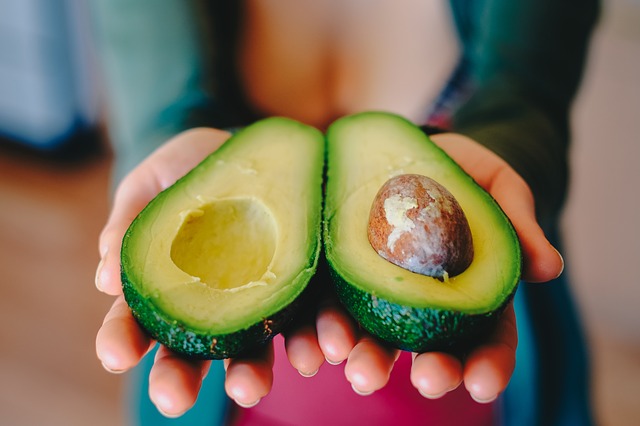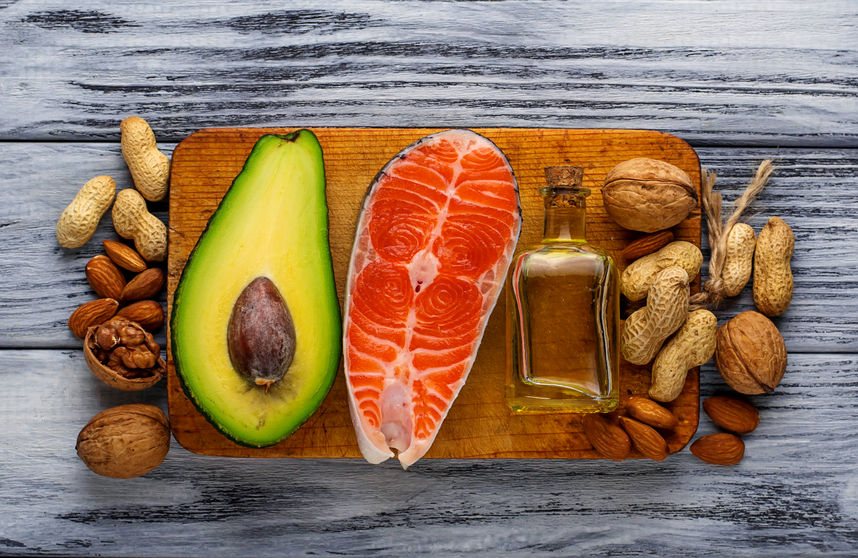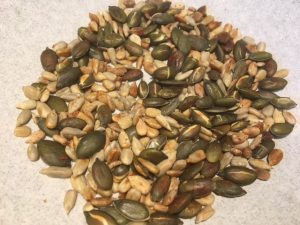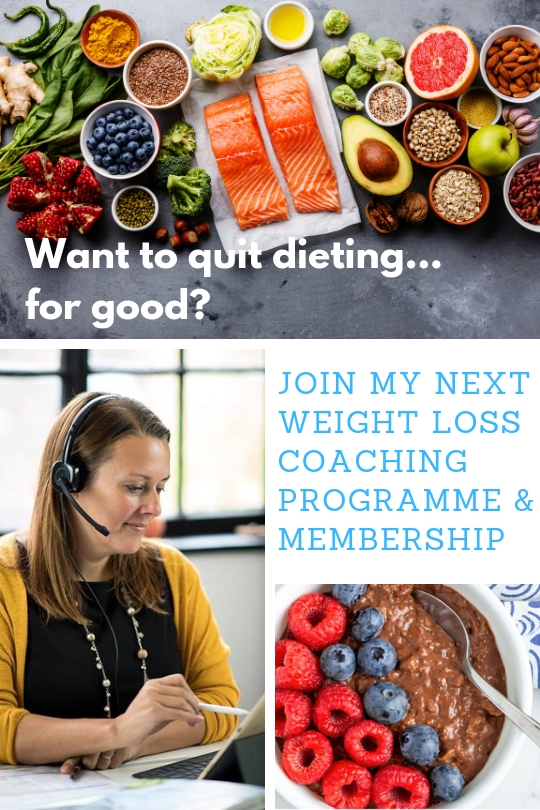 Did you know that the right kind of fats are so important for your health, even if you’re trying to lose weight? So many people are stuck in the mentality that eating fat makes you put on weight, but the reality is that we need good fat in our diet. In fact, it can actually help us to lose weight!
Did you know that the right kind of fats are so important for your health, even if you’re trying to lose weight? So many people are stuck in the mentality that eating fat makes you put on weight, but the reality is that we need good fat in our diet. In fact, it can actually help us to lose weight!
Most fats are really good for you. Certain ‘fat soluble’ vitamins such as A, D, E and K, can only be absorbed by the body if consumed with some sort of fat, and every single cell in your body needs fat. Your heart and your brain need good fat, the right kinds of fat can help to reduce inflammation and can even help you to lose weight by getting your cells to listen to insulin and your thyroid hormones. Fats also help us to feel full… so we’re not craving the wrong kind of foods. This article explores the truth about fats, how much you need and what types to choose.
Is eating low fat good for us?
At first glance, scientists thought it made sense to cut fat from your diet when you want to lose excess body fat, and this misunderstanding has been preached and followed by millions of people for decades. It’s been the nutritional basis behind every single diet from 1950 to fairly recently hasn’t it?
It’s led to the development and sale of countless ‘low fat’ and ‘fat free’ foods that still populate our supermarket shelves today. The idea of eating low fat has become deeply ingrained into our collective cultural conscious. When I work in my clinic with people trying to lose weight, I often see a fear of fat… because so many mainstream diets have told them they can’t go near anything fatty.
The only problem is… low fat diets are not healthy, long term. And often they don’t work. Yes, some people do lose weight on a low calorie, lower fat diet. Plenty of people have done it. But for most people it’s not sustainable, it takes a lot of willpower, and it doesn’t lead to long term health benefits.
The vast majority of people end up giving up, and then yo-yo back to their original weight and end up putting on even more than they lost in the first place. Continual calorie counting just isn’t good for your metabolism!
Why do our bodies need fat?
Our bodies are genetically engineered to crave fat. It’s what keeps us going, keeps us warm, and keeps up our energy levels. Each and every cell in our body has fat surrounding it, and it’s these fats which give our cells insulation and allow messages and nutrients to be transported into our cells, and waste products out.
Whilst good fats do have more calories than the same amount of carbs or protein, they take much longer to digest. The result? They keep us feeling full and satisfied much longer than any other type of food.
So, does that mean you can run off and fry up a mountain of streaky bacon in melted butter for breakfast? Of course not. I’m certainly not a fan of eating loads of fried foods and endless amounts of fats.
Balance is the name of the game when it comes to healthy weight loss.
What kind of fats are healthy?

The other thing to remember is that not all fats are created equal. Let’s quickly run through a few sources of healthy fats that you might want to eat more of.
- Avocado: One of my favourite healthy fats, it’s packed with monounsaturated diet (which features heavily in the Mediterranean diet, as well as heart healthy Vitamin E). Add this delicious fruit to salads, sandwiches to replace butter, wraps, or put some slices on top of eggs or grilled meat. Avocados are also delicious mashed up on toast, turned into guacamole and even in smoothies!
- Olive Oil: choose extra virgin olive oil – it makes a great base for salad dressings (mix 3 tablespoons of oil with 1 tablespoon of lemon juice or balsamic vinegar, plus a half teaspoon of mustard. Shake in a jam jar – and hey presto!) Olive oil can be used to finish and flavour all sorts of food, and I encourage most people to include a teaspoon every day. Look for cold pressed, extra virgin olive oil to dress your salads – and don’t waste this fantastic oil in your frying pan, or you’ll be destroying a lot of the goodness. Instead use coconut oil or some butter for cooking, and keep your cold pressed extra virgin olive oil for dressing salads or veggies.
- Nuts and Seeds: Another healthy snack that you can keep at your desk, in your bag, in your car and in your cupboards. Nuts and seeds are full of healthy fats, vitamins and minerals. Eat them on their own, make your own healthy trail mix, or sprinkle them on your salad. Remember when buying nuts and seeds, avoid the roasted, sweetened or salted versions – instead buying the plain version. You can also use nut butters such as Whole Earth, Pip and Nut or Meridian, all available now in supermarkets.Do also remember to watch how many nuts and seeds you consume – you can have too much of a good thing! A handful of two per day is ideal… and research shows that nut eaters seem to live longer than those who don’t eat nuts! Flaxseeds and chia seeds are especially rich in heart and brain healthy omega 3 fats, and a must for those on a vegetarian or vegan diet. Add a tablespoon of ground flaxseed to your porridge or yoghurt every day.
- Coconut Oil: I love using coconut oil for baking and cooking. It’s really stable at high temperatures, so perfect for your stir fries! It also gives a lovely sweet taste to baking.
- Omega 3 rich oily fish: I couldn’t write an article about healthy fats without talking about omega 3 rich oily fish. Mackerel and sardines are the best source of omega 3, with salmon and fresh tuna also contributing (but most salmon are now farmed, so not as rich in omega 3 fats as they used to be). Research looking at the health of different populations has clearly demonstrated a benefit to eating fish – with fish eaters generally living longer. I always advise my pescatarians and non-vegetarians to include oily fish 2 to 3 times per week (but don’t overdo the tuna as it can be quite high in mercury). If you’re not a fish fan, do consider supplementing an omega 3 fish oil – the health benefits have been studied extensively and very much linked to heart and brain health, and helping to reduce inflammation around the body.
 Toasted Super Seeds Recipe
Toasted Super Seeds Recipe
If your family isn’t keen on seeds (no they are not just for birds), then this is a great way to get them on board! Add to salads, soups and stir fries.
- Put a handful of mixed seeds into a dry pan over a medium heat. Sunflower seeds and pumpkin seeds work well, you could also add in some amaranth for crunch or some pine nuts.
- When they start to pop and jump a bit, add half to 1 teaspoon of tamari/soya sauce and stir well for about 1 minute.
- Serve on salad or as a tasty snack.
- You can also make a sweet version by using cinnamon, vanilla extract and a teaspoon of maple syrup.
You can also add seeds to your baking – from flapjacks to cakes. If your family aren’t keen, just grind them up first!
